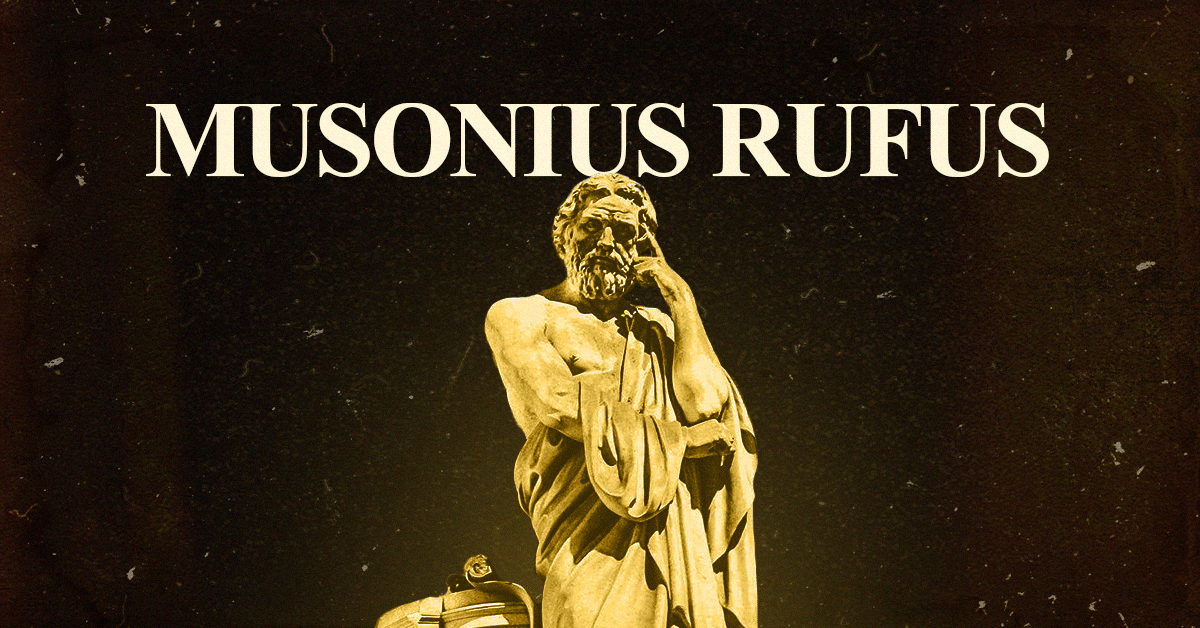
A teacher of philosophy in Rome during the reign of Nero, Gaius Musonius Rufus has been referred to by some scholars as the “Roman Socrates.” Born to an Etruscan family sometime before 30 A.D., he is considered to be one of the great Stoic philosophers. Though he didn’t leave any writings of his own, we have his dutiful students to thank for the wealth of Musonius Rufus quotes that were transcribed during his lectures.
Exiled not once, not twice, but three times, Musonius Rufus is an ideal Stoic to turn to if you are looking for inspiration when it comes to facing adversity. Though the circumstances of his death aren’t entirely clear, it is believed that he may have been executed before the year 101 A.D.
Rufus built a considerable following during his own life and was known to be admired by both philosophers and theologians, including Marcus Aurelius.
Some writers have categorized the ethos of his philosophy into three parts: discernment, integration, and practice. Let’s take a look at some of the best quotes from the Stoic philosopher to learn how to distinguish good from bad, how to integrate this information, and how to put it into practice.
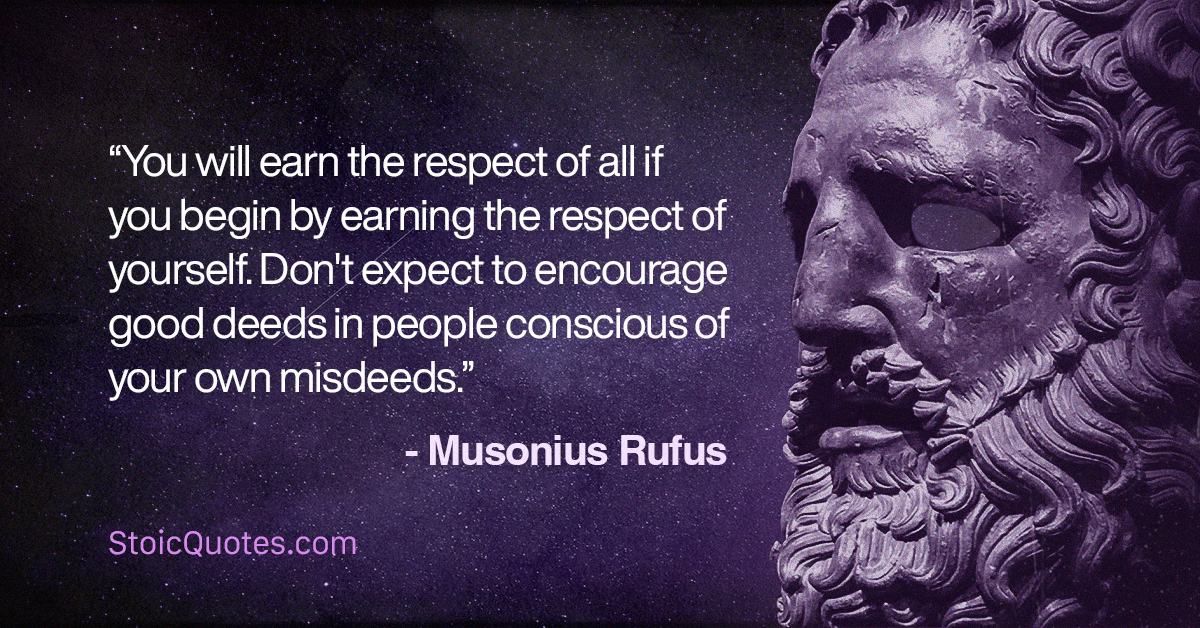
The philosophy of Musonius Rufus largely consists of determining the rules of the conduct of life. He believed that all knowledge should be applicable in one's daily life and serviceable to action.
"You will earn the respect of all if you begin by earning the respect of yourself. Don't expect to encourage good deeds in people conscious of your own misdeeds."
-Musonius Rufus
This is a sentiment that we have heard echo through the writings of Stoic philosophers that came both before and after Musonius Rufus. Hecato of Rhodes, for example, is quoted as saying “What progress, you ask, have I made? I have begun to be a friend to myself.”
This also calls to mind a well-known Biblical passage from the book of Matthew where Jesus calls out the hypocrisy inherent in judging others for faults when you yourself are just as guilty (often referred to as the parable of “the Mote and the Beam.”)
To look at the first part of the quote, we are faced with a concept that rings so true yet can be so difficult to practice. If you want to be a person that has the respect of others, you have to become a person that you are willing to respect first.
The second half of the quote points to the reality that trying to influence others to act better won’t work if you clearly aren’t taking your own advice. In order to be a person that encourages others to improve their lives and conduct, you have to first fully audit yourself and ensure that you are abiding by the standards you claim to uphold as virtuous.
"From good people you’ll learn good, but if you mingle with the bad you’ll destroy such soul as you had."
-Musonius Rufus
This Musonius Rufus quote calls to mind the famous Jim Rohn concept stating that we are all the average of the five people we spend the most time with. Pointing to the reality of how much we are influenced by the people around us, both Rufus and Rohn recognize the reality that surrounding ourselves with people we don’t respect or admire will mean that we become less worthy of respect or admiration ourselves.
Do you feel like the people in your life inspire you, encourage you, and respect you for who you really are? Or are you constantly dealing with being put down, negged, or otherwise mistreated? Are the people around you striving to be good, or do they bask in the hedonistic freedom of a virtueless life?
It can be one of the most difficult things to choose to create distance between yourself and those around you. Whether or not that’s the right thing to do will depend on your own circumstance and is ultimately a choice only you can make. However, the reality that being around good people will call out the good in you and being around bad people can be incredibly destructive to your soul is something that shouldn’t be considered lightly.
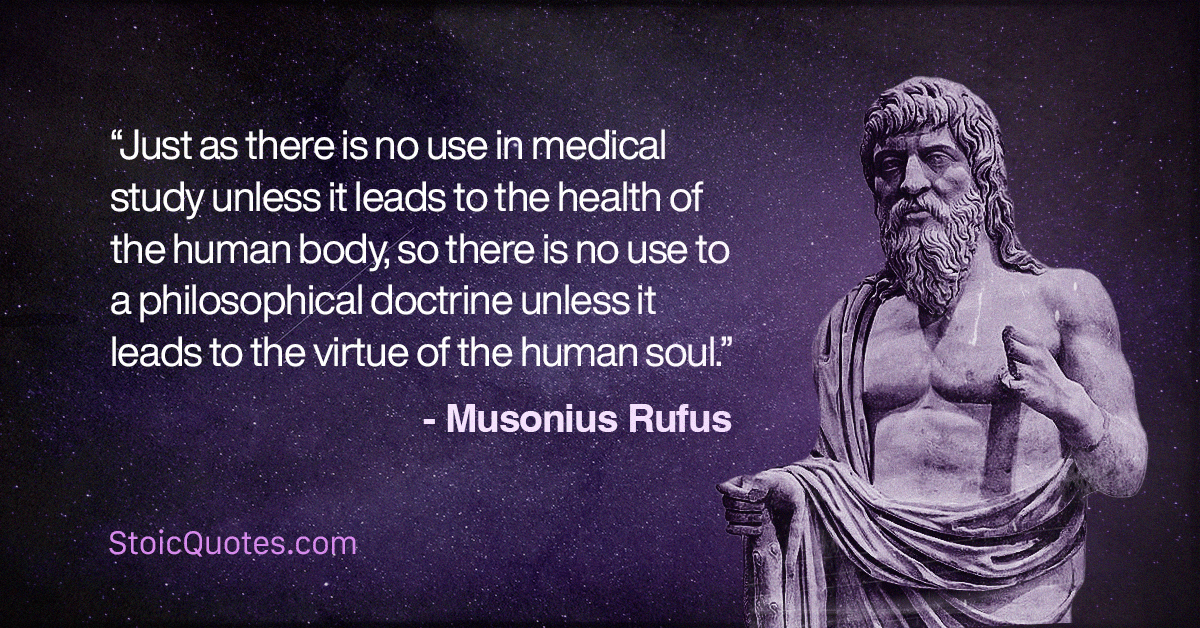
Musonius Rufus believed that philosophy should be more than just words or abstract thoughts. Philosophical ideas shouldn't just bounce around the rooms of a school or the pages of scholars. Instead, philosophy is something that anyone can pursue and actively apply to their actual lived experience.
"Generally speaking, if you devote yourself to the life of philosophy, whilst tilling the land at the same time, I couldn’t compare it to any other way of life, nor would I prefer any other livelihood."
-Musonius Rufus
How nice does that sound? Till the land in some bucolic Roman state, all the while concerning yourself with philosophical ideas. There you are: exercising your mind while simultaneously exercising your body, all while surrounded by the infinite miracle that is nature.
While the lifestyle Rufus is outlining here might not be as accessible as it has been at other times in the past (land is expensive, big agriculture dominates the industry, and it’s really hard to make enough money to sustain yourself), it’s hard to not picture the scene as a utopian vision.
Even if starting a farm doesn’t quite fit into your life plan, we can still gather some thoughts worth considering here from our friend Musonius Rufus. How can we incorporate a deep relationship with nature into our modern lives? How can we strike the perfect balance between philosophy and lived experience, man and nature, mind and body?
"If we were to measure what is good by how much pleasure it brings, nothing would be better than self-control- if we were to measure what is to be avoided by its pain, nothing would be more painful than lack of self-control."
-Musonius Rufus
This is a beautiful quote that turns the primary argument of nihilistic hedonists on its head. (There’s a good chance you know one or two such characters, even if they’ve never heard of either term before.)
While hedonists believe that the pursuit of pleasure is the most important thing in life, the typical understanding of what constitutes pleasure includes things like food, drugs, and sex. Here, Musonius Rufus is saying that, in reality, it is self-control that brings the most pleasure. On the flip-side, a lack of self control is what ultimately created the most pain.
Rather than viewing pleasure and pain as instantaneous occurrences, Rufus is thinking on a longer scale. After all, you likely know this to be true yourself. You might get a lot of immediate pleasure from your first few drinks at a party, but then you start to have diminishing returns, only to experience deep discomfort the next day. If you had, conversely, practiced self control and not allowed yourself to drink to excess, you would actually experience greater overall pleasure and less pain.
"Just as there is no use in medical study unless it leads to the health of the human body, so there is no use to a philosophical doctrine unless it leads to the virtue of the human soul."
-Musonius Rufus
Reading Stoic quotes can be a great way to gain some inspiration and insight into how to live the best life. However, it’s all too easy to only engage with Stoic thought in the realm of heady philosophical thoughts rather than doing the hard work of determining how to actually apply it to your life.
In this quote, Musonius Rufus makes it clear that philosophy is only useful if it is integrated into how you actually live your life, just like studying medicine would be pointless if it weren’t applied to improving physical health.
"Virtue is not simply theoretical knowledge, but it is practical application as well…So a man who wishes to become good not only must be thoroughly familiar with the precepts which are conducive to virtue but must also be earnest and zealous in applying these principles."
-Musonius Rufus
Again, we see Musonius Rufus driving home the fact that virtue is not just an abstract concept, but something that can be expressed in physical reality. He argues that it’s not enough to be well-versed in the idea of virtue if you strive to be good. It’s also necessary that you do the hard work of integrating these principles into your daily life.
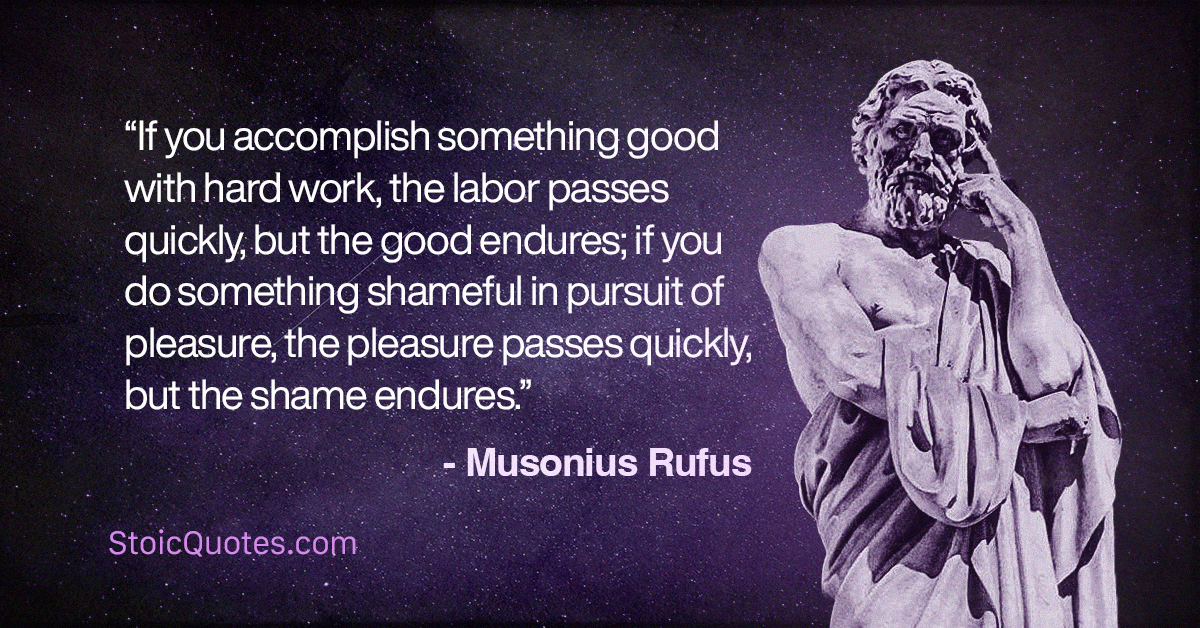
From the Stoic point of view, there are a lot of major issues with contemporary American culture. Everywhere you look, you're encouraged to pursue short-lived pleasures, whether it be through drinking and drugs, consumerism, social media dopamine hits, video games, Netflix, or something else entirely.
Even when hard work is valued in our culture, it's often portrayed specifically in relation to a very careerist path, whether that be becoming a lawyer, doctor, or climbing your way up the corporate ladder. There is kind of a "work hard, play hard" mentality that seems to exist in American colleges and carries over to American adulthood, where we put our all into the pursuit of our careers only to collapse into hedonism on the weekends.
When Gaius Musonius Rufus discusses the contrast between hard work and the pursuit of pleasure, though, one might imagine that he would view the pursuit of status and validation through a career as an example of the latter, rather than the former.
"If you accomplish something good with hard work, the labor passes quickly, but the good endures; if you do something shameful in pursuit of pleasure, the pleasure passes quickly, but the shame endures."
-Musonius Rufus
Again, Musonius Rufus hits us with the hard truth that not all experiences that give us pleasure are created equal. When you work hard to create something good, you create a lasting sense of good in your life and in the world around you. On the other hand, seeking pleasure for the sake of pleasure will only give you a brief feeling of enjoyment, often followed by much less pleasant emotions (shame, disgust, etc.)
We live in a world that is constantly promising us instant gratification. However, if we’re honest with ourselves, we know that isn’t where true good comes from. If we are willing to commit ourselves to the good, work hard, and view life with a slightly longer timeframe, we can ultimately lead a more pleasant life.
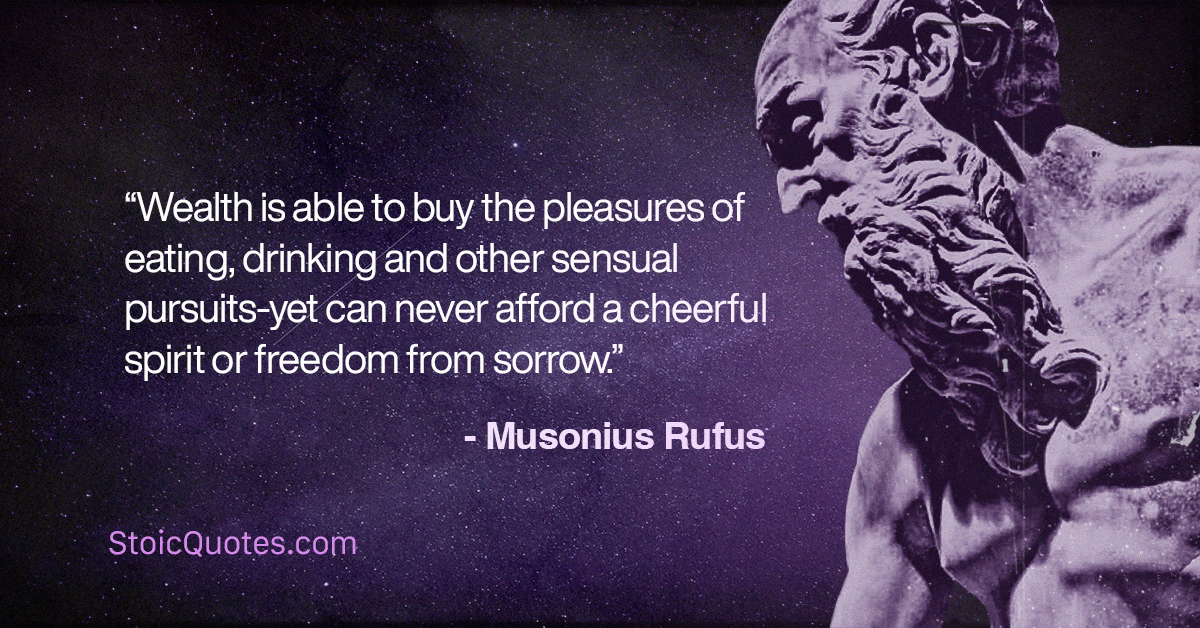
Musonius Rufus was known to practice total abstention from all forms of self-indulgence and extreme self-discipline. In his quotes on wealth, we are able to explore his views on the topic-- not only does wealth not buy you the true existential joys of life, but it can actually cause new problems that get in the way of living a truly virtuous life.
"Wealth is able to buy the pleasures of eating, drinking and other sensual pursuits-yet can never afford a cheerful spirit or freedom from sorrow."
-Musonius Rufus
In a time of deep economic uncertainty, it’s all too easy to be single-mindedly focused on accumulating wealth. While there’s nothing wrong with ensuring that you’ll have what you need later in life, it’s important to not let the pursuit of wealth fool you into thinking it’s an answer to all of life’s problems.
In fact, wealth can also leave you in a position where you feel like you have so much to lose if you let your guard down for an instant that you can never fully let yourself relax or enjoy yourself in a deep, spiritual way. At the end of the day, money won’t buy you love, happiness, enlightenment, or freedom from pain.
"What good are gilded rooms or precious stones-fitted on the floor, inlaid in the walls, carried from great distances at the greatest expense? These things are pointless and unnecessary-without them isn’t it possible to live healthy? Aren’t they the source of constant trouble? Don’t they cost vast sums of money that, through public and private charity, may have benefited many?"
-Musonius Rufus
If you’re about to make an offer on that gaudy McMansion in town, maybe take a moment to meditate on this Musonius Rufus quote. Not only does he point out that it’s perfectly possible to be healthy without the excesses of wealth, but that having such elaborate homes is ultimately very costly both in time and money. If you want to live a peaceful, healthy life, you might consider the call to minimalism here and how it could actually mean that you are better able to really enjoy your time on earth.
One of the notions of Stoicism that seems to appeal to many modern people is the realization that only certain things in life are in your control. By distinguishing what is in your control and what isn't, the idea is that you can live a more peaceful, enjoyable, and virtuous life.
"In our control is the most beautiful and important thing, the thing because of which even the god himself is happy— namely, the proper use of our impressions. We must concern ourselves absolutely with the things that are under our control and entrust the things not in our control to the universe."
-Musonius Rufus
One of Musonius Rufus’s most famous students was Epictetus, a man who was enslaved in his early life and went on to become a legendary Stoic philosopher. In many of his quotes, we learn about the importance of understanding what is and what isn’t in your control. If you can successfully do this, according to Epictetus, you can live a virtuous life.
In this quote, we see where Epictetus may have gotten his ideas about control from. Musonius Rufus argues that it is of the utmost importance that we put our focus on the realms of life where we have control. Otherwise, we must learn to have trust and faith in the universe itself when it comes to everything that falls outside of our control.
What is in our control, then, you might ask? According to many Stoics, our realm of control consists of things like our opinions, desires, actions, and reactions. Beyond that, everything else is in the hands of the universe.
What does it mean to live a good life? What does it mean to die with distinction? Let's check in with our Stoic friend, who offers valuable insight into the notions of living a virtuous life and how the knowledge of the reality of death can inform the way that you choose to live each day.
"For mankind, evil is injustice and cruelty and indifference to a neighbor’s trouble, while virtue is brotherly love and goodness and justice and beneficence and concern for the welfare of your neighbor."
-Musonius Rufus
In the actual lived experience of being a person in the modern world, it can feel really difficult to know what the “right” thing to do is or if we’re doing the wrong thing. Here, though, Musonius Rufus outlines a very simple understanding of the difference between good and evil.
It can feel difficult to uphold the concept of brotherly love and concern for the welfare of your neighbor in a culture that seems to be ripping apart at the seams. However, it could be for exactly that reason that this quote is particularly relevant at this moment in modern history.
"It is not possible to live well today unless you treat it as your last day."
-Musonius Rufus
If you knew today was your last day on earth, what would you do? What would you definitely not do?
There is something profound that happens to people when they are confronted with the reality of their own death. Many of the things they were primarily concerned with are no longer important, and they are able to see their lives from an entirely different perspective.
This calls to mind a quote from the late Terence McKenna, who was diagnosed with a highly aggressive form of brain cancer in 1999. In an interview with Erik Davis, he states how life felt after a "guy in a white coat" told him he was "going to be dead in four months." He said that "when it first happened, and I got these diagnoses, I could see the light of eternity, a la William Blake, shining through every leaf. I mean, a bug walking across the ground moved me to tears."
Is it possible to achieve that kind of relationship with the simple beauties of life without such a dire diagnosis? Can you imagine that each day is your last, allowing you to truly live your life to the fullest and appreciate the beauty in each moment?
Here, Rufus makes the bold claim that one must treat each day as their last if they are to live well. When you wake up in the morning, consider asking yourself, "would I do what I'm about to do if I knew I wasn't going to wake up tomorrow?"
If you answer "no" to the above question, there are two basic options for how to respond. One, you can change your attitude to make it suit the conditions of your life. Or, two, you can take action to change the conditions of your life to make them more suitable for your goals.
"Since every man dies, it is better to die with distinction than to live long."
-Musonius Rufus
Sometimes it seems like our culture is so much more geared towards the quantity of life rather than the quality of life. We are so afraid of death that we will spend truly remarkable amounts of money to keep our loved ones alive using advanced medical technology for just a few additional months, even when their quality of life is quite obviously poor. When we learn of a person who has died young, we are quick to feel as though they have been robbed of many years of life.
What if we're looking at this thing backward, though? According to Musonius Rufus, that is exactly the case.
After all, everyone will die, but not everyone will live and die with distinction. Why not strive to do something great in your life, rather than fixating on the fear that taking chances could potentially shorten your lifespan?
If you weren't afraid of death, what would you want to accomplish? What do you feel like you can uniquely contribute to the world? Is it possible that you're so fixated on building up your retirement account that you are forgetting to live?
Of course, the suggestion here isn't necessarily to divorce your wife, sell your house, buy a sailboat and start heading south. The opposite of focusing on the quantity of life doesn't have to mean complete disregard for the future or finances. Reaching a place where you die with distinction can certainly be the result of carefully set goals that unfurl over decades.
The point, rather, is to really tap into what it would mean for you to be accomplished in life. Let's say you've been busting your butt to work your way up the corporate ladder. If it's your life purpose to become the CEO of an international corporation, best of luck to you. If it's not, though, then why are you on that path? Is there a better way forward for you? If you could rid yourself of the fear of death, honestly, how would you live a life that allows you to die with distinction?
"Choose to die well while you can; wait too long, and it might become impossible to do so."
-Musonius Rufus
The phrase "to live well" isn't unusual at all in our culture, but how about "to die well"? What would it mean to die well, and why would waiting too long make it impossible to achieve?
We are so sheltered from death and so afraid of it, it seems, that the notion of dying well is far from our minds. Instead, we focus on extending life and avoiding death.
You could also apply this notion to a more metaphorical death, so to speak, such as the death of your career or the death of a certain phase of your life.
For example, there's a chance that you have run into issues in your career where you felt that something that was occurring was unethical or wrong. However, you were all too aware that speaking up would jeopardize your career. While it can be scary to choose the hill you're going to die on, we must never forget the importance of upholding the values that we believe lead to the betterment of the whole.
As another example, perhaps you've gone through a phase in your life (or several) that you no longer ascribe to. Whether you went through a period of being a hardcore vegan, a college republican, or a phase when you died your hair green and spiked it into a mohawk, it's easy for these things to become woven into our sense of identity. It can be scary to realize that you want to move beyond the phase that you're in because it can leave you unsure of who you are and worried about what others will think of you.
It's important, though, to think of the alternative. Let's say you've been working at a coffee shop for five years after college, all the while proselytizing to everyone you meet about the evils of capitalism. Over time, though, you start to realize that you're changing as you age, and you don't want to live paycheck to paycheck anymore.
For some people, the fear of being a hypocrite will leave them chained to that espresso machine forevermore. For others, though, with the courage to recognize that they have grown and are ready to move on, the process of shedding that part of themselves can be a lot like a death and rebirth. In this sense, these latter individuals have taken the opportunity to "die well" while they can, rather than waiting until it was "impossible to do so."
Engaging in the heady world of ideas can be a lot of fun, but Musonius Rufus is here to remind us that philosophy is only useful if we actually put it to use in our actions. Philosophy is a way of life, not just a bunch of abstract ideas for us to use for our amusement.
While the philosophy of Musonius Rufus is in many ways very similar to that of his student, Epictetus, there is still much to be gained from learning about this now largely forgotten Stoic thinker.
Are you searching for more Stoic ideas that you can use to live a better and more virtuous life? Be sure to check out our ever-expanding library at StoicQuotes.com.
We encourage you to share this article on Twitter and Facebook. Just click those two links - you'll see why.
It's important to share the news to spread the truth. Most people won't.